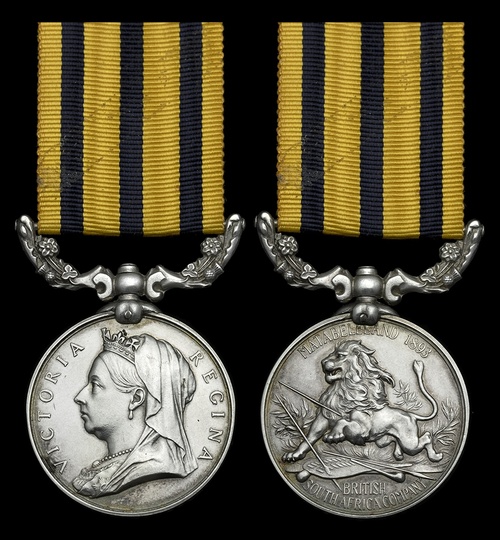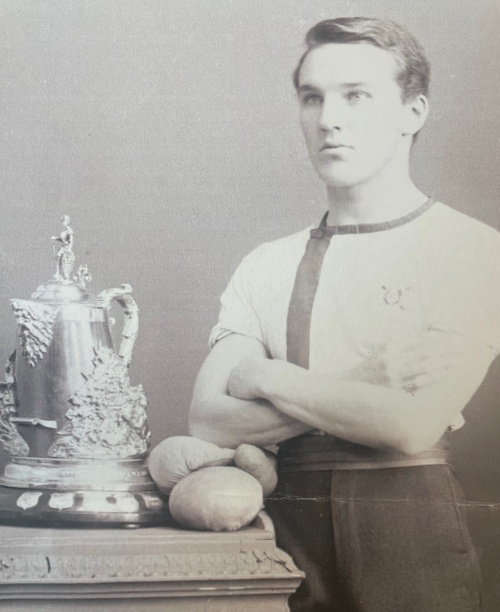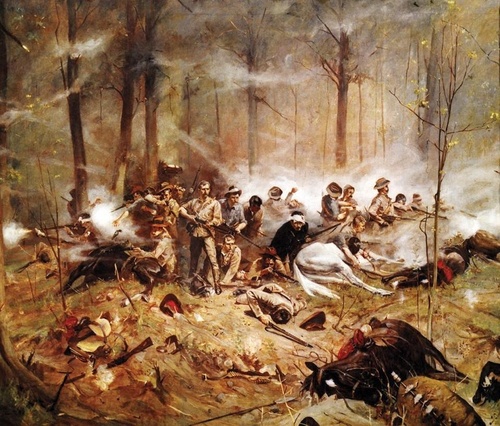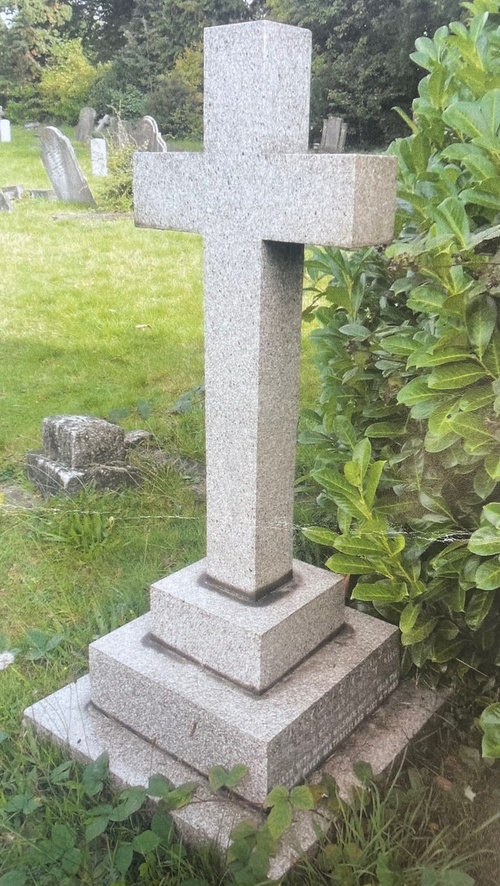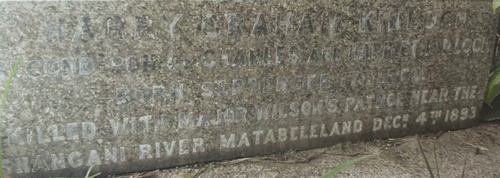Auction: 24003 - Orders, Decorations and Medals
Lot: 53
'He [Kinloch] entered Mashonaland about three years ago, and practised with considerable success as a solicitor at Salisbury. He had also attained some reputation as an athlete, was a good cricketer, and an ex-amateur Champion light-weight boxer.
When war against Lobengula was declared he entered the Salisbury Horse as a Trooper, and went through the whole campaign until killed on the Shangani River.
No man was more thoroughly popular in the whole country than Kinloch, who united quiet unassuming manners to considerable abilities and sterling qualities.'
The Downfall of Lobengula: the cause, history, and effect of the Matabeli War, refers.
The British South Africa Company’s Medal to Corporal H. G. Kinloch, Salisbury Horse, a member of Major Wilson’s heroic patrol, killed in action at Shangani River on 4 December 1893
British South Africa Company Medal 1890-97, reverse Matabeleland 1893, no clasp (Corpl. Hy. G. Kinloch, Salisbury Horse), a slightly later issue with partially officially re-engraved naming, good very fine and a rare casualty
Harry Graham Kinloch was born in 1863 at Norwood, Surrey. Educated at Harrow and Trinity College, Cambridge, he was a talented pugilist and took several prizes in his time. He went out to Mashonaland circa 1891 and was a member of 'B' Troop, Salisbury Horse. He accompanied the force under Major Forbes to the Shangani River, where under Captain Borrow, he joined Major Wilson’s ill-fated patrol.
Shangani River
Frederick Burnham, the American scout, later Chief of Scouts under Lord Roberts, was the last man to leave the beleaguered patrol before their final stand at Shangani River. In his book Scouting on Two Continents, he describes his last meeting with Major Wilson and his officers, and the fate that befell his patrol:
‘It had now stopped raining. Captains Judd, Kirton, Fitzgerald, Greenfield and Brown gathered with us round Wilson. The first three were experienced colonials, and Wilson asked each what he thought to be the best move. Kirton, with a bitter smile, said: "There is no best move." Fitzgerald said: "We are in a hell of a fix. There is only one thing to do, cut our way out.” Judd said: "This is the end.”
Picking up the threads of the grim story, we are told by Majors Forbes and Sir John Willoughby that, after crossing the river and following the king's spoor, Major Wilson and his men reached a series of scherms, or temporary encampments protected by felled bush or trees. These scherms were filled with Matabele, who, however, offered no resistance, probably because they did not know the strength of the whites, or believed them to be but the advance guard of a larger body. So the Patrol rode on till they reached the royal scherm, within which the king's wagons were dimly visible in the gathering gloom. Here a halt was called, and Lobengula summoned to surrender. The reply was an ominous rattle of arms within the reed fence, while parties of Matabele, rifle in hand, came hurrying up from the rear. With so small a force nothing could be done, and the Patrol withdrew into the bush, Captain Napier and Troopers Robertson and Mayne being sent for reinforcements. These in due time appeared in the form of Captain Borrow with eighteen mounted men. A miserable night was passed under arms in the drenching rain, and when day at length dawned, Major Wilson decided to make one more dash for the king, with the tragic result, which will not soon be forgotten in South Africa. From the start the Patrol was outnumbered, and almost as soon as the attack began, Ingram, Burnham, and Gooding had to be sent to cross the river, if that were possible, to ask for further support. That support, however, never arrived, and Burnham's first breathless remark to Major Forbes, after reaching the main body, was “I think I may say we are the sole survivors of that party.” The Shangani had risen in flood, added to which Major Forbes was himself attacked in force on the way down to the river. Either of these circumstances was enough to prevent the arrival of succour in time to save the doomed men to whom the last chance of escape was lost. To the end, however, there was no thought of surrender, no request for quarter. They resolved to show the Matabele that the white man could play a losing as well as a winning game. Taking cover behind the dead bodies of their horses, with an iron calmness they fought on for two long hours, pouring a destructive fire into their encircling foes, and coolly singling out the Indunas for their aim. One by one, however, they sank under the heavy fire from the bush, but many of the wounded continued, so the natives say, to re-load and pass their rifles to their uninjured comrades. Again and again the Matabele would issue from their cover to attempt a conclusive charge, but again and again were repulsed with a well-directed fire; upon which Wilson and his men would wake the echoes with an undismayed, defiant cheer. But at last the end came. Of the thirty-four valiant men whose hearts beat high with hope and courage as they rode behind their leader in the early dawn that morning, only one remained erect; the rest lay prone, dead or dying, upon that field of honour.
The name of the one man who stood at bay against an army of Matabele will never be known; his remains could not be identified. But the natives tell that, picking up several rifles and bandoliers, this hero amongst heroes made his way to an ant-heap some twenty yards from where the rest lay stretched upon the earth. From that point of vantage he checked, single-handed, several rushes of the Matabele with a cool and deadly fire. At length, shot through the hips, he sank on his knees, but continued to load and fire until he succumbed to his wounds. Then, and not till then, the Matabele came out from the bush, but on reaching the hallowed circle where the Patrol lay side by side, were fired upon by several of the unconquerable wounded who were still alive. So great had been the terror and demoralisation inspired by the desperate bravery of the Patrol, that when the revolvers rang out the natives turned and fled precipitately into the bush; and it was not till several hours later - ‘when the sun was right overhead' - as the Matabele tell the tale - that they again ventured to leave their cover. But by this time death had mercifully come to the wounded, and as the native warriors gazed upon the forms of their fallen foes there was silence.’
Together with an old Harrow chum, Harold Brown, Kinloch fell in that famous action. He is commemorated at the Harrow Cemetery, Middlesex.
Subject to 20% VAT on Buyer’s Premium. For more information please view Terms and Conditions for Buyers.
Sold for
£7,500
Starting price
£3500

